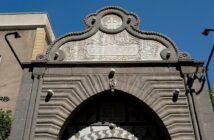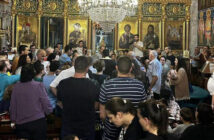Source: News Chief
Christians who fled their homeland to find safety back President Donald Trump’s travel ban.
TARPON SPRINGS – The special service wouldn’t start for an hour. But by 5 p.m. Thursday, people were pouring into the church.
Men in dark suits, hoisting toddlers on their hips. Women in high heels, pulling lace veils over their dark hair.
They came from Miami, Orlando and Jacksonville, to Florida’s largest Syrian Orthodox church. They came to see the church patriarch, to take communion with him, to get his blessing and hear his news.
The worshipers had come from Syria, too. Or their parents, or grandparents. They still spoke the language. And everyone worried about some relative or friend who was still suffering in their war-torn homeland, where terrorists bomb churches, kidnap nuns and behead bishops.
Less than a week had passed since President Donald Trump prohibited people from seven Muslim-majority countries from immigrating to the United States for 120 days – and barred Syrians indefinitely. Though Trump has said Christian refugees might be given priority, many across the country remain confused by his order and outraged that America would try to keep out anyone in danger.
For years, these Syrian Christians had been selling their jewelry to send money to loved ones still stuck there, begging elected officials to let more people in.
But on Thursday, no one brought it up. But when asked, they supported Trump’s travel ban.
By 5:30 p.m., the church was packed with more than 200 Orthodox Christians who in their homeland were religious minorities. In the back, a silk banner proclaimed, “100 years, 1915-2015, Sayfo Syriac Genocide. NEVER FORGET.” In the front, a choir started chanting in Syriac, in front of an American flag.
Words scrolled across screens beside the ornate altar, three versions of each hymn – in English, Aramaic and phonetic Syriac:
“Hallelujah!”
“Oh Lord have mercy on us.”
“Help us.”
The Rev. John George Kouki, 43, stood behind the scarlet curtain. He had grown up in Syria, studied at the monastery in Damascus, planned to stay and minister to his countrymen.
When the church sent him to lead St. Athanasius in Tarpon Springs in 2002, he didn’t want to move to America. He thought he could help more at home.
It wasn’t until 2011, he said – once the war started – that he realized why he was here. So many Syrians in Florida needed reassurance and guidance.
Every week, the prayer lists got longer, more people fearing for their families. Then folks started asking Father John to remove names. Some people they had been praying for had been killed. For others, hearing their loved ones’ names read month after month became too painful.
Father John brought his mother and brother over from Syria. One sister just got into Canada. The other is in Lebanon, holed up in a church basement with her three children, waiting to flee. He worries now, more than ever, how is he going to help people get out?
Just before 6 p.m., the sweet smoke of incense wafted through the church, tiny bells began to tinkle and the scarlet curtain opened to reveal a parade of priests, their floor-length robes adorned with sequined doves.
The patriarch, His Holiness Mor Ignatius Aphrem II, chanted prayers in Syriac, then gave communion. Outside the stained glass windows, the day began to darken. An altar boy handed out long, white candles and everyone shared the light.
“Oh Lord have compassion and mercy upon us,” intoned the patriarch, his first words in English. “Help us.”
He spoke about courage, about not abandoning the Syrians abroad, who are trying to rebuild their homeland. He prayed for protection.
Then the scarlet curtain closed. And the choir resumed.
In the front row, Rose Gabro sang beside her youngest daughter. Rose and her husband, Jim, had fled violence in Syria in 1988. They had married in the United States, had their three children here.
Rose works in the Sunday school. Jim owns a dry cleaner. All their children went to college and want to be doctors. The American dream.
They’re frightened for their friends and families. Like so many other Americans, they’re also afraid for themselves.
The special service lasted more than three hours. But by 8 p.m., no one wanted to leave.
Children ran around the courtyard while their parents stood in line sipping coffee, waiting to snap selfies with the patriarch.
No one was talking about the immigration ban. So a reporter asked.
“About 95 percent of my congregation is Republican,” said Father John. “We are with Trump because he supports Christianity. We must pray for peace. And hope.”
What people really need to pray for, Jim Gabro said, is “Our president, Trump. And our vice president. We need to pray for wisdom and guidance for our rulers.”
Gabro and everyone in his family voted for Trump. His daughter Lexi, 19, is a senior at the University of South Florida.
“President Trump has ideals that we, as Christians, agree with,” she said. “Pro-life being the greatest one.”
Gabro’s wife has 14 siblings who escaped to Sweden, Germany, Egypt and Romania. She still has cousins in Syria. But she applauds the president’s new immigration ban, saying, “Whatever it takes to protect us.”
“The ban is awesome,” Gabro said. “And it’s not a Muslim ban. We know families that were sent back who are Christian.”
He offered an analogy about peanuts, similar to one Donald Trump Jr. made about Skittles, which might have been lifted from a meme about M&Ms.
“If you have a jar of, say, 200 peanuts, and you know two of them might be poisoned, would you eat from that jar?” he asked.
We have to be careful, he said, vigilant. “Those two terrorists could kill a lot of people.”
He is worried about people still in Syria. Of course, he is, he says. But he’s more worried about letting terrorists into the United States, shattering the safety he finally found here for his family.
He said, “You have to understand.”


![Suprasl: Celebrate the World Day of Orthodox Youth [February 2nd (15th old style)]](https://ocl.org/wp-content/uploads/2024/01/SUPRASL-LOGO-214x140.jpg)
